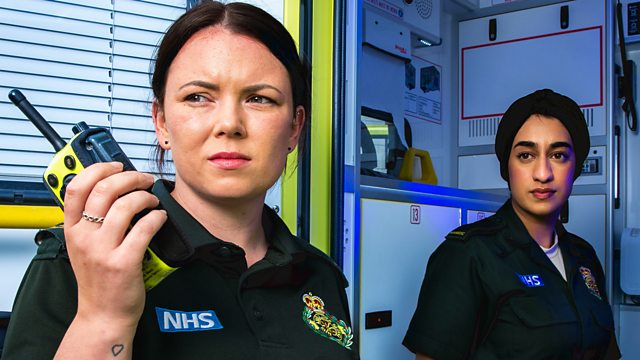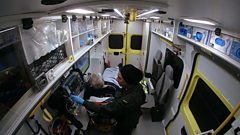Ambulance crews struggle to deal with life-threatening emergencies while also being the last resort for those who have no-one else to turn to.
This episode follows the team in control and crews out on the road across Lancashire as they respond to those in need. It was filmed in 2023 in the north west of England, one of the areas hardest hit by the cost-of-living crisis, where the ambulance service increasingly acts as a vital safety net for those struggling to cope. It does this while also working hard to deliver emergency care to over seven million people living in the region amid some of the most challenging times in the NHS’s 75-year history.
It’s just after 5pm, and reports of a male lying face down in the road come into control. Advanced paramedic Amy, who attends the most life-threatening emergencies, is immediately dispatched. Amy arrives and takes the lead. CPR continues, but the patient’s heartbeat is irregular. Amy makes the decision to drive the patient to hospital for a last attempt to save his life.
As the night shift begins, 82 patients are waiting for an ambulance, with a new call being taken every 30 seconds.
Paramedics Cameron and Kiera are called to a category 2 emergency – a nine-year-old girl with a bowel blockage. On arrival, they discover the patient has been suffering for months and not getting the help she needs, despite her mum’s best efforts. Despite her discomfort, the crew manage to tease a smile from their young patient when they discuss her brother's upcoming wedding and ask to see the beautiful dress she’ll be wearing – they’re determined she will be better in time to make the wedding in five days' time.
Across the region, over a quarter of all ambulance crews currently treating patients are queuing at hospitals, and 46 patients are waiting for an ambulance. Meanwhile, one of the call handlers is on the phone with a verbally abusive patient who has called the service 35 times in the last year, and dispatcher Vicki despairs when she has a job come through for somebody with athlete's foot.
Paramedic Kelsea and newly qualified paramedic Bushra are dispatched to a 40-year-old male, unconscious, not breathing and bleeding from the head. Due to the severity of the call, senior paramedic Debbie is also dispatched. The patient is bleeding heavily from a fall after a seizure. Debbie, Kelsea and Bushra work to stem the blood. Despite all this, he is initially reluctant to go to hospital for further investigation.
Dispatcher Gary sends Bushra and Kelsea to an 82-year-old lady who has had a fall. On arrival, they discover she has been on the floor all night. She didn’t call because she thought the effects of the fall might wear off, and the paramedics gently admonish her, saying she should have called for help straight away.
Four hours into the day shift, call volume has nearly doubled. Paramedics Cameron and Kiera are dispatched to a 57-year-old male with abdominal pain who is fighting for breath. On arrival, they discover their patient has lost five stone in just four and a half months and is in constant chronic pain – but every time he takes himself to hospital he’s sent home without treatment. He’s at breaking point, but paramedics Cameron and Kiera are determined to help, so they take him to hospital again.
A new call comes in from a GP for a 65-year-old male she’s concerned about. The patient has bad abdominal pain, and his diabetes isn’t controlled. The GP is worried he may have sepsis. The crew immediately get the patient onto the ambulance. En route, he takes a sudden downward turn – his heart rate is fluctuating between being dangerously fast and dangerously slow. The crew notify the hospital of his worsening condition while Bushra seeks to calm the patient.
Across the patch, Cameron and Keira are dispatched to an asylum seeker who is feeling suicidal. He is desperately missing his family, who are still in his home country. He says he has tried everything to get them over to the UK, but his efforts have failed. As a result, he says he wants to die. The paramedics are quick to establish this isn’t a job for the Ambulance Service – especially as the patient has been referred for mental health support already. It is yet another demonstration of how, when people don’t know who to turn to, they often turn to the Ambulance Service.
The Ambulance Service always responds to life-threatening emergencies, but now, with the longest wait times in the history of our NHS, the paramedics are also dealing with many other types of call. This episode highlights a service under severe pressure where, despite the constraints and the daily challenges they face, the crews still work tirelessly to provide the best care they can to the communities they call home.
Last on
Clips
-
![]()
"I'll be helping people the rest of my life"
Duration: 05:41
-
![]()
"I've got you, don't worry"
Duration: 02:15
Credits
| Role | Contributor |
|---|---|
| Narrator | Christopher Eccleston |
| Executive Producer | Simon Ford |
| Executive Producer | Peter Wallis-Tayler |
| Series Editor | James Robinson |
| Series Producer | Tasha McLintock |
| Director | Dan Nightingale |
| Production Company | Dragonfly Film and Television |
Broadcasts
- Wed 6 Mar 2024 21:00������̳ One except Nightlight
- Tue 12 Mar 2024 23:40������̳ One except Northern Ireland, Northern Ireland HD, Wales, Wales HD & Nightlight
- Wed 13 Mar 2024 00:15������̳ One Northern Ireland HD & Northern Ireland only
- Wed 13 Mar 2024 00:40������̳ One Wales & Wales HD only
- Thu 8 Aug 2024 00:35



